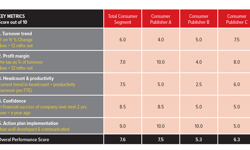One session at the PPA Independent Publisher Conference that particularly stood out was ‘How to build and retain a strong team to drive business success’. It was presented by Terry Grimwood, publishing director of DJ Murphy, and Marc Hartog, founder and CEO of Apptitude Media.
Both were refreshingly frank about the organisational, personnel and resourcing challenges facing smaller publishers. “We are making it up as we go along”, admitted Marc at the start of his talk and what a relief it was to hear someone say it.
Terry and Marc had lots of good advice for the smaller publisher:
1. Know your destination, but don’t worry too much about the map
From the start, said Terry, he had a clear of idea of what he wanted the company to be, but not much idea of how they would get there. They started with a wish list and this developed as and when the opportunity arose. Over the years, a lot of activity has been out-sourced but the company has steadily built up its in-house resource in new media and multi-channel publishing. Much of the time, staff members have taken the lead in moving projects forward, especially in the area of social media. A well motivated and enthused staff has provided the insight and skills and the company itself has provided the framework and structure. Terry described the whole process as “sporadic and iterative”, basically “learning as we went along”. Critically important is having the flexibility to take advantage of opportunities as and when they present themselves. A speaker on one of the other sessions, Ciaran Morton, managing director of Rhinegold Publishing, had a good expression for this approach. He called it “experiential learning”.
2. Get your company culture right
Experiential learning can only work if the company culture is conducive to it. For Terry, the company has to be open-minded, organic, flexible and opportunistic, and underpinning all that was a genuine respect for staff and belief in its people.
Both Terry and Marc had reservations about employing dedicated HR staff, certainly while your headcount was under fifty. In fact, Marc had brought along his HR director, aka Penny, a stuffed Penguin with a pink wig. It was clearly his intention to retain a stuffed toy as his HR director for as long as possible.
Terry found the concept of HR depersonalising and Marc said not having a dedicated HR resource allowed him to get closer to his staff.
Scepticism about the value of ‘HR’ didn’t mean that either company did not believe in enlightened approaches to their staff. Quite the opposite.
An open and transparent culture underpinned both companies. At DJ Murphy, there was a full staff meeting every month; everyone had annual appraisals and salary reviews (set six months apart).
Whilst acknowledging that they couldn’t compete with larger publishers on salaries, Apptitude was offering equity incentives along with perks and benefits sourced from suppliers such as Health Shield and Perkbox.
And, central to a positive company culture was striking a healthy work / life balance and … having fun … yeah!
3. Make it fun!
As the owner of a small publishing company, the other hat you are inevitably forced to wear is that of entertainments manager. Working for you has got to be FUN.
You need to create an atmosphere which attracts and retains staff – the vibe has got to be right. For Marc, this means lots of eating cake / drinking alcohol, encouraging staff to bring their kids in (presumably only occasionally), generous holiday allowances and birthday lie-ins. Location is also critical, and he clearly had no regrets about the move to Shoreditch. And his top tip for fostering good staff welfare? A £30 retractable ping-pong net – great for stress relief, apparently.
Terry says promoting a good work / life balance is key. He has a dim view of the presenteeism seen in so many workplaces, and is proud of the fact that you won’t find too many people at their desks after 5pm in his company.
4. Use interns / work experience / apprenticeships as a low-risk (though not easy) way to recruit good staff
Both companies use interns, but are quick to add that they’re paid. (Where are the non-paying ogres we keep hearing about?)
Six month paid internships are popular at DJ Murphy and the company is flexible about how they are deployed. They usually start in the marketing department and then “radiate outwards” depending on their skills and interests. Terry highlighted a number of success stories: Sophie had come to the company on a work experience placement, then got a paid internship and is now the main driving force behind their growing video production unit. Sam came though as a web editor and is now in charge of clothing (yes, clothing) production. Adam started as a designer on Horse & Rider before getting into content apps and branded game apps (Pony Jumps Clear!).
Marc is quick to add that taking on interns / apprentices is no easy quick fix – in his experience, it takes six months to bring them up to speed.
Recruitment, in general, continues to be a challenge. Getting the right fit is important. Marc looks particularly at people’s interests in trying to identify those capable of wearing multiple hats (crucial in a small company) and working autonomously. Apptitude has had little joy using traditional recruitment methods but has had some success using their own channels, such as their corporate website, Facebook page and their own British Journal of Photography website.
Although Marc and Terry didn’t say so specifically, it occurred to me, listening to them, that there’s a lot to be said for working for a small publisher. At big organisations, with their tightly delineated departmental structures and finely crafted job descriptions, variety isn’t always on offer. People have clearly defined roles, and step outside your role and you’ll inevitably be treading on someone else’s toes. At small companies, everyone mucks in and there’s incredible opportunity to try new things and get involved across the whole spectrum of publishing activities. Celebrate smallness!
And finally, I must make a quick mention of ‘retail theatre’. This is a term I used to hear all the time at publishing conferences, but seems to have been banished in recent years. In fact, I forget the last time I heard it at a conference – certainly not in the last five years. So, hats off to Dan Sims, retail director of Seymour Distribution – a timely reminder, if one was needed, of the continuing importance to many publishers of single copy print sales through the newstrade.












